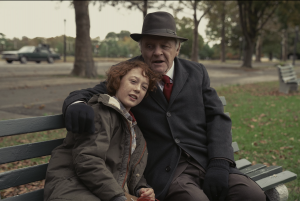The potency of James Gray’s “Armageddon Time” relies on the film being watched in 2022.

A New York boy coming of age in 1980, protagonist Paul Graff (Banks Repeta) turns to a friend and tells him that his favorite band is The Beatles.
“I hear they’re getting back together soon,” he says with confident earnestness.
The sad joke is that, of course, the band (unbeknown to Paul) was not getting back together. John Lennon would be fatally shot on Dec. 8 of that year, just a couple of months after Paul starts his sixth-grade year at a public school in Queens, N.Y.
On day one of the new school year, Paul rekindles his friendship with Johnny (Jaylin Webb), a Black boy held back a year, and the two find glee in making mischief. Johnny almost always receives the harsher punishment of the two, but their friendship endures, despite Paul’s family’s sour outlook on the presence of a Black kid in Paul’s life. Eventually, the Graffs transfer Paul to the same private school as his older brother, where Paul trades in his well-worn striped turtlenecks for a trim suit and his Black classmate for pale, wealthy ones who spit the “n”-word.
As Paul struggles at his new school, Johnny does as well. Tired of the punitive nature of his public school, he drops out and asks increasingly larger favors of Paul: He needs a place to stay away from his senile grandmother and money to run away to Florida, where he can become a NASA astronaut.
Meanwhile, Paul’s father Irving (Jeremy Strong) is a hot-and-cold repairman who has no problem whipping his son with a belt upon learning from his wife Esther (Anne Hathaway) that Paul had smoked pot in school. And Paul can no longer rely on the goodwill of Esther, the president of the district’s parent-teacher association.
Education is the most important thing to the tight-knit Ashkenazi Graff family.
Paul’s grandfather Aaron Rabinowitz, played as gentle yet haunted by Anthony Hopkins, encountered enough strife fleeing Ukraine in decades past. He wants Paul to keep his head down and remember the sacrifices his family made to immigrate and assimilate to the United States to give the younger generation a chance to attend college. A private school funded by the Trump family (yes, that Trump family) is the family’s best bet.
Between Hopkins’s tra-la-la dialogue with Paul and the palpable weight of family trauma bearing on him, the patriarch builds the foundation of a family just trying to make it, finding levity in the ever-serious days building up to the election of President Ronald Reagan.
Among the next generation, Hathaway’s and Strong’s depictions of Paul’s parents show a tenacity to achieve this American dream, even through a willingness to step on the heads of others. Despite being warped by his family’s and classmates’ racism, Paul still wants to be friends with Johnny. He knows how to stand up for what’s right, but with no backup and increasing familial pressures to stay out of trouble, it only becomes harder for him to do so.
In a seamless dialogue between childhood optimism and grown-up jaded realism, “Armageddon Time” has no problem letting the audience squirm with a struggling Jewish family’s anti-Blackness and proclivity towards stiff punishment. And Gray doesn’t pull punches in showing Johnny’s descent into trouble.
He relies on modern-day zeitgeist to a fault. When Fred Trump, father of the 45th U.S. president, introduces Maryanne Trump to speak at Paul’s school, the scene effectively deflates the bubble of period-era verisimilitude Gray had so slowly and steadily built. Clues of the private school’s elite and conservative status abound, even without the presence of the notorious family.
A period piece of the 1980s, the film says more about the politics of the 2020s but perhaps not in the clever, understated way Gray intended. With its strong cast, attention to detail and gut-punching plot, “Armageddon Time” could have cemented itself as an evergreen modern classic of interracial friendship and the turmoil of generational trauma. But sometimes a little too on the nose, it makes itself vulnerable to feeling dated in a time of a rapidly changing political and social landscape.







